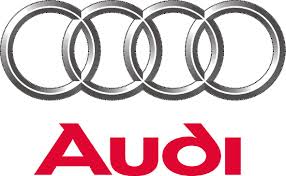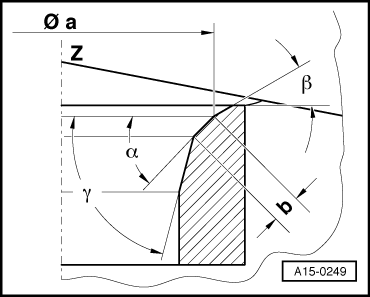|
Servicing valve gear
Reworking valve seats
Note:
If a good seating pattern cannot be obtained by grinding the valve seats (lapping), they must be refaced (reworked):
Special tools, testers and auxiliary items required
-
◆ Depth gauge
-
◆ Valve seat refacing tool
Notes:
-
◆ When repairing engines with leaking valves, it is not sufficient to reface the valve seats and renew the valves. The valve guides must also be checked for wear. This is particularly important on high mileage engines =>Page 15-73.
-
◆ The valve seats should only be reworked just enough to produce a perfect seating pattern.
-
◆ Calculate the maximum permissible reworking dimension before reworking.
-
◆ If the reworking dimension is exceeded, the function of the hydraulic tappets can no longer be guaranteed and the cylinder head should be renewed.
Calculating maximum permissible reworking dimension
-
‒ Insert valve and press it firmly against valve seat.
Note:
If the valve is to be renewed as part of a repair, use a new valve for the calculation.
-
‒ Measure distance between end of valve stem and centre axis of camshaft (centre axis of camshaft is level with top surface of cylinder head).
-
‒ Calculate max. permissible reworking dimension from measured distance and minimum dimension.
|
|
|---|
|
Minimum dimensions
|
|
Outer inlet valves
|
Centre inlet valve
|
Exhaust valves
|
|
34.0 mm
|
33.7 mm
|
34.4 mm
|
Measured distance minus minimum dimension
= max. permissible reworking dimension.
|
|
|---|
|
Example (for outer inlet valve):
|
|
|
Measured distance
|
34.4 mm
|
|
-
|
Minimum dimension
|
- 34.0 mm
|
|
=
|
Maximum permissible reworking dimension
|
= 0.4 mm
|
Note:
If the maximum permissible reworking dimension is 0 mm or less than 0 mm, repeat the measurement with a new valve. If the measured result is again 0 mm or less than 0 mm, renew the cylinder head.
| 
